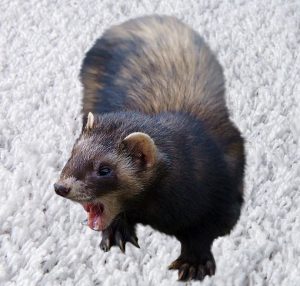 Link to All Ferret Health Care Articles
Link to All Ferret Health Care Articles
Caring For Your Ferret’s Teeth – Preventing Periodontal Disease In Your Ferret
Ron Hines DVM PhD
Your Ferret has 34 teeth when it is an adult. A few more than a cat (30) and a few less than a dog (42).
Tooth Care At Home
The best thing you can do to keep your ferret’s teeth healthy is not to over feed soft foods or treats. It is fine to give them occasionally – but never as a substantial part of your pet’s diet. If you feed a more crunchy diet, you will minimize the amount of tartar that builds up on your pet’s teeth just as the wild ancestors of your ferret did.
What To Do When Tooth Tartar Builds Up?
Even on a great diet, tartar will eventually begin to accumulate on your ferret’s teeth. If you have long fingernails and are inclined to, you can scrap a lot of this material off while it is still soft. You can also brush your ferrets teeth with a toothbrush designed for cats and some pet toothpaste. I do not suggest toothpicks or other small objects for cleaning because they can break off and be swallowed. Start dental care early, so your pet learns to accept it. Concentrate on the sides of the teeth that are closest to the cheek where tartar tends to accumulate most. Be sure to brush gently and slowly.
Periodontal (Gum) Inflammation
Even with good home care, tartar will eventually cause inflammation along your pet’s gum lines. By the time ferrets are six years old, they often have this problem. It is due to small amounts of tartar that accumulate below the surface of the gums that surround the teeth. This accumulation causes chronic irritation that gives these margins a bright red appearance. Bacteria use these areas to proliferate. With time, the gum margins will recede, exposing the softer tooth material (dentin). This problem also gives your ferret a strong breath odor. It may also cause it to drool. These areas also bleed easily. Your veterinarian can control this problem by cleaning your pet’s teeth. This is done using a dental hoe and an ultrasonic tooth cleaning apparatus. The technique is safe – but the pet must be anesthetized to do it and the group doing it must be adept at anesthetizing ferrets – not just dogs and cats.
If periodontal disease is left untreated, bacterial infections of the gums can spread to the heart, liver and kidneys causing serious health problems. This happens when clumps of bacteria living in the inflamed areas, break loose and enter the blood stream.
Chipped Or Broken Teeth
Chipped and broken teeth are quite common in ferrets. It is usually the upper fangs that get broken while the pet chews on the mesh of its cage. Ferrets have a habit of grasping these areas and pulling back forcefully. When this happens, the tooth should be examined by a veterinarian to see if the pulp (root) cavity of the tooth has been exposed. Sometimes, these teeth simply wear down to the roots from this chewing.
I have not seen many infections or pain associated with fractured or worn fangs. This is at least in part due to the fact that the pulp cavity in ferrets is narrow in diameter and short. If the fracture or wear involves three quarters of the visible tooth, the tooth should be extracted or plugged and sealed. If this is not done, an infection will spread to the pet’s jaw. If this has occurred, there will usually be a small bump of bone on the face just below (or above) the tooth. If enough tooth is left and the root has not been exposed, it can be ground and polished smooth. It is possible to do root canals on ferret teeth and add artificial crowns – but I do not suggest this. There is no medical need for this. When it is done for aesthetics, it is for the owner’s sensibilities, not the ferret’s.
Tooth Defects Or Cavities
When actual tooth defects are present, it usually means the ferret was ill or nutritionally deprived when its permanent teeth were developing. These can be stained areas, groves and rings. Staining also occurs when the pets received tetracycline while they were still growing.
Teeth Condition And Its Effects On General Health
Any systemic disease that weakens your ferret’s general constitution makes gum disease more likely. It commonly occurs in ferrets affected by adrenal, liver and kidney disease as well as in cancer. So the first thing to do is examine your pet’s over-all health.
Tooth Problems In Baby Ferrets
Immature ferrets often have a strong mouth odor when they are teething. They may run a slight fever as well. This is a natural phenomenon. For many years, a dab of human baby teething medication containing benzocaine was recommended for baby ferrets with sore gums. That was probably a bad idea. We now know that products containing benzocaine or similar numbing agents can destroy blood hemoglobin, transforming it into methemoglobin – a dangerous situation.
Dental Chews
Not all ferrets will accept chew treats. But if they do, they are a great way to keep your pet’s teeth and mouth in good condition. Be sure they are marketed for ferrets and are similar to the ones in this link. But do not let them make up more than 10% of your pet’s diet.
Objects & Things Stuck In Your Ferret’s Mouth
Occasionally, foreign objects such as sticks and toys will lodge in the ferret’s mouth between the two canine teeth. These pets often keep their mouth partially open. They may paw at their mouth and back up. They may drool. String will occasionally get wrapped around the pet’s teeth. When this happens, it needs to be removed with a forceps. Be especially careful that these pets have no further access to string-like objects because the much worse condition of intestinal obstruction can occur the next time it happens.
What About Trimming My Ferret’s Teeth To Stop It From Biting?
This is not a good idea. If your ferret bites, you need to discover the underlying psychological cause and treat that. Removing or cutting his fangs is a lot like taking the batteries out of a smoke detector to keep it from making noise. If it was done to your ferret and an infection in the remaining tooth has spread to the root or gums, the tooth needs to be extracted.


 Dear reader, Besides your donations, Visiting the products that Google chooses to display on this webpage helps me pay the cost of keeping this article on the Web. As you know, sites like mine that are not designed to make money are getting harder and harder to find. Best wishes, Ron Hines
Dear reader, Besides your donations, Visiting the products that Google chooses to display on this webpage helps me pay the cost of keeping this article on the Web. As you know, sites like mine that are not designed to make money are getting harder and harder to find. Best wishes, Ron Hines